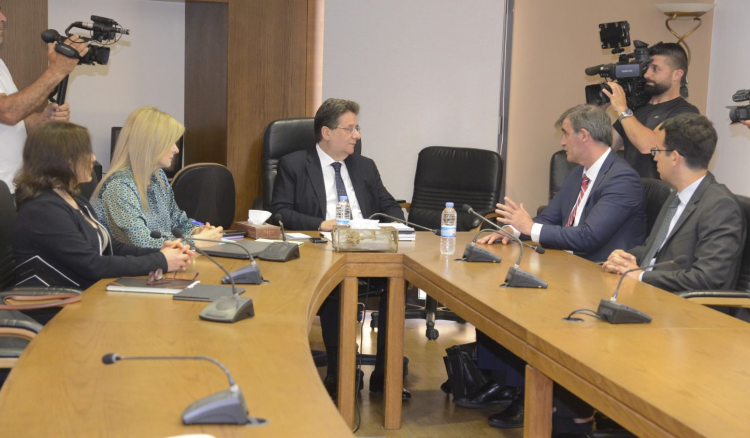
Meeting between an IMF delegation and MP Ibrahim Kanaan in the Lebanese Parliament on May 22. (Credit: NNA)
BEIRUT – An International Monetary Fund (IMF) team said, after visiting Beirut, that Lebanon has made "some progress in lowering inflation and stabilizing the exchange rate" but that "these reforms are insufficient for recovery," according to a press release published by the international institution on Thursday.
An IMF team, headed by Ernesto Ramirez Rigo, visited Beirut from Monday to Thursday to discuss "recent economic developments and progress on key reforms", according to the IMF press release.
"While there has been some progress in lowering inflation and stabilizing the exchange rate, supported by the Banque du Liban’s (BdL) decision to end monetary financing and foreign exchange subsidies, as well as the elimination of the fiscal deficit, these reforms are insufficient for recovery," the IMF press release read.
The head of the IMF team said that "measures by the Ministry of Finance (MoF) to improve revenue mobilization from VAT and customs, by adjustment of the customs dollar to the market exchange rate, brought the estimated 2023 fiscal deficit close to zero" and "the joint efforts of BdL and MoF have also enabled some accumulation of foreign reserves."
“However, these policy measures fall short of what is needed to enable a recovery from the crisis. Bank deposits remain frozen, and the banking sector is unable to provide credit to the economy, as the government and parliament have been unable to find a solution to the banking crisis."
The IMF's press release reads that "the absence of a credible and financially viable strategy for the banking system continues to hamper economic growth and deposit recovery while giving rise to an increasingly cash-based and informal economy and larger risks of illicit activities."
In April 2022, Lebanon reached a staff-level agreement (SLA) with the IMF that would grant the government access to around $3 billion over four years, provided the country undertakes a series of fiscal, financial and monetary reforms set by the international institution. However, Lebanon has made little progress on its required reforms.
According to the IMF press release, the "lack of action on necessary economic reforms continues to exert a heavy toll on Lebanon’s economy and population."
"Economic reforms are essential for a strong and sustainable recovery and for attracting new investment and international financial support."
Lebanon is in its fifth year of an unprecedented economic crisis, which has pushed more than half of the population below the poverty line.
Finally, the head of the IMF said that "negative spillovers from the conflict in Gaza, and fighting at Lebanon’s southern border, and the strain of the refugee crisis have exacerbated an already dire economic and social situation", adding that the "high risks associated with the conflict create significant uncertainty to the economic outlook."
Hezbollah and Israel have been engaged in daily skirmishes along the Lebanese southern border since Oct. 8, one day after the start of the Gaza war. A Lebanese official told AFP earlier this month that Israeli bombardment of south Lebanon "has caused more than $1.5 billion in damage."